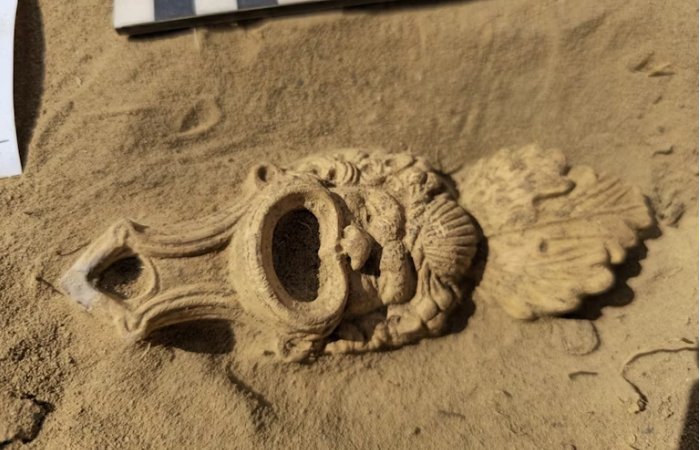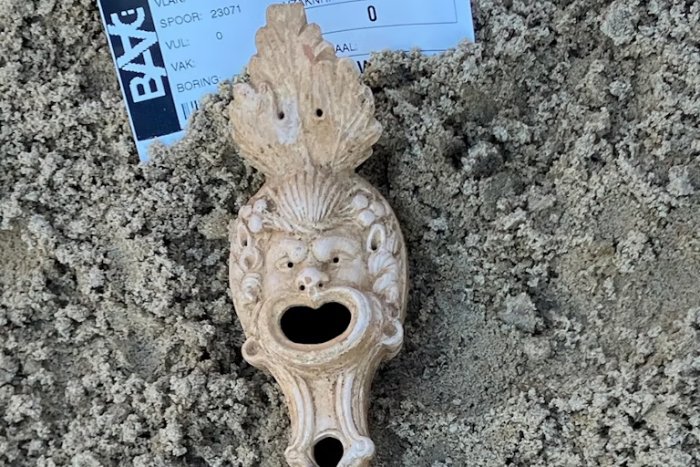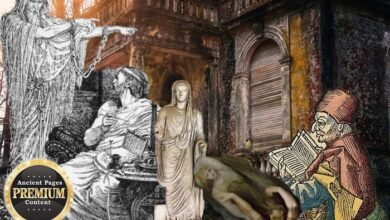Unique Roman Oil Lamp Decorated With A Crafted Mask Discovered In The Netherlands

Jan Bartek – AncientPages.com – Archaeologists excavating in Cuijk, Noord-Brabant, the Netherlands, have reported the discovery of a unique 1,900-year-old Roman oil lamp decorated with a finely crafted mask. According to Land van Cuijk, the find was made on the former Nutricia site in Cuijk, located near a Roman cemetery.
In Roman times, from approximately 50 B.C. to A.D. 400, Cuijk was known as Ceuclum and was inhabited by the Germanic Batavi tribe, as mentioned by Julius Caesar. Its strategic location on the Maas made it a significant settlement along the route from Maastricht to Nijmegen. The wealth of finds in the cemetery reflects the prosperity of Ceuclum’s inhabitants.
This unique Roman oil lamp, shaped like a theatrical mask, was found in a cemetery in Cuijk, Netherlands. Credit: Gemeente Land van Cuijk
This type of oil lamp is fairly common, but this one, with its distinctive decoration, is unique in the Netherlands. The Roman oil lamp is shaped like a theatrical mask. Its filling inlet sits in the open mouth of the mask, framed by wide eyes and thick brows that may represent a satyr, the half-human, half-goat figure, or perhaps the ancient Greek god of wine. Archaeologists found the oil lamp in one of the roughly 70 graves they have already excavated. The lamp, dating to the second century A.D., was discovered along with four ceramic plates, two jugs, a cup, a glass bowl, and a bronze bowl.
Credit: Gemeente Land van Cuijk
According to he research team, the dishes found in the grave likely once held food and drinks. The lamp, part of this collection, served as a source of light for the journey to the afterlife. While archaeologists have cleaned the lamp, its decoration remains a topic of debate. Some suggest it depicts Bacchus, the ancient god of wine and debauchery; however, scientists believe it is more likely an actor’s mask.
Comedy and tragedy masks are iconic symbols of the performing arts, dating back to ancient Greece. Actors used these masks to highlight expressions and switch characters as needed. Masks were also linked with Bacchus, known as Dionysus or Dionysos in Greek mythology, who was both the god of wine and a patron of theatrical arts; his followers often wore masks during worship.
The municipality has declared that this lamp holds significant museum value and is considered an exceptional discovery. The items found in these graves provide insight into Roman burial practices, where deceased individuals were typically cremated with grave goods, including oil lamps, coins, and jewelry, as tributes for their journey to the afterlife. This decorated oil lamp from the second century AD exemplifies such grave goods.
See also: More Archaeology News
Archaeological research commenced last June at the former factory site to preserve valuable artifacts. In 2023 and 2024, additional noteworthy archaeological discoveries were made among building foundations at this location, according to municipal reports. So far, only a small portion of the Ceuclum cemetery has been excavated, but archaeologists anticipate uncovering many more Roman artifacts—and potentially even richer graves—as excavation continues on-site before housing development begins after research completion.
Written by Jan Bartek – AncientPages.com Staff Writer






